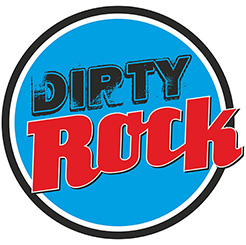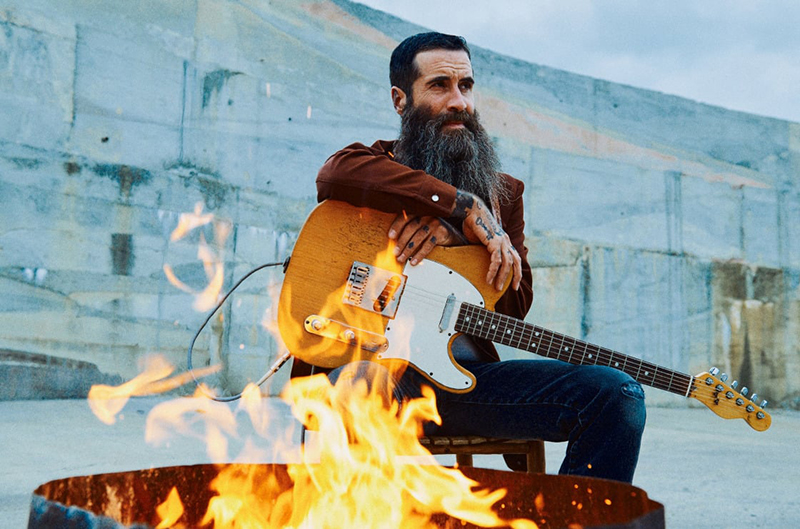Ser un músico es vivir la vida en un estado de contradicción. Anhelan la carretera y actuar cuando están en casa, pero también anhelan su hogar cuando están de gira. Su creatividad y su espíritu libre florecen cuando viajan, comparten su arte y entretienen. Pero su lado más suave e introspectivo es igual de importante para su arte y su equilibrio vital. JP Harris es un perro de carretera implacable y un poeta reflexivo. Su quinto LP ‘JP Harris Is A Trash Fire‘, producido por JD McPherson, muestra el dar y recibir, la comprensión de lo que más importa y el aprendizaje de cómo gestionarlo todo.
JP Harris tiene una historia que debería permitirle escribir melodías clásicas de country donde pasó una década yendo de un trabajo a otro, con trabajos de peón agrícola, leñador, carpintero y pastor. Todavía se considera un carpintero que escribe canciones, pero con ‘JP Harris Is A Trash Fire‘ tenemos la sensación de que Harris va a estar demasiado ocupado como para preocuparse por sus martillos o clavos.
“Creo que el country arrastra un estigma desde hace más de treinta años, y con razón. La maquinaria comercial ha vaciado gran parte de su poesía y autenticidad. Así que es normal que muchos que vienen de escenas más crudas como el punk o el metal sientan rechazo hacia el country tradicional. Pero me encanta ser la puerta de entrada para esas personas al buen country y al folk de siempre”
Conversamos con JP Harris hace unas semanas sobre los temas del álbum, sus influencias y su proceso de composición y cómo contar historias contundentes que conecten con la gente. Para corroborarlo, tendrás oportunidad de ver a JP Harris por nuestro país del 19 al 25 de mayo en una gira compuesta por 7 fechas.
Fechas de la gira de JP Harris & The Tough Choices 2025:
- 19 mayo en Barcelona, Razzmatazz3
- 20 mayo en Valencia, Loco Club
- 21 mayo en Madrid, Sala El Sol
- 22 mayo en Zaragoza, Rock & Blues Café
- 23 mayo en Vitoria, Urban Rock
- 24 mayo en Avilés, Niágara
- 25 mayo en Santander, Little Bobby
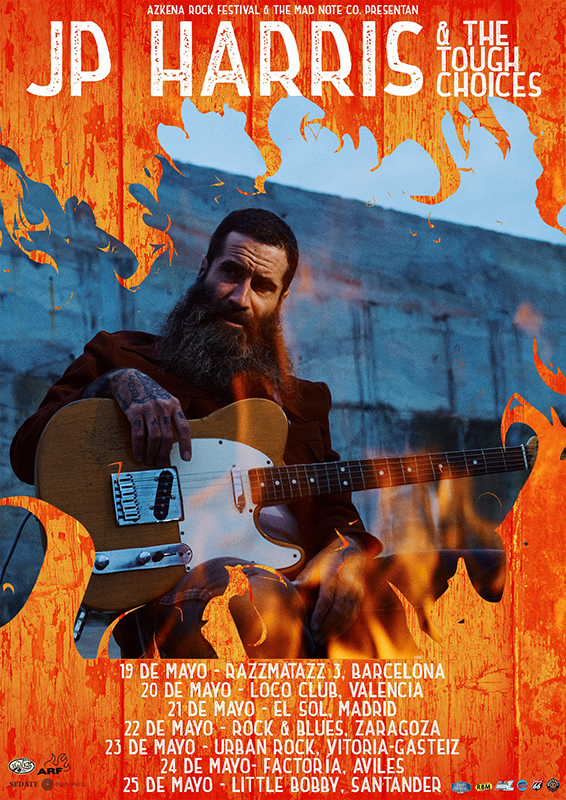
Entrevista a JP Harris con motivo de su gira española en mayo:
¡Nos alegra muchísimo tenerte de vuelta, JP! Han pasado ya dos años desde aquella gira por España con John R. Miller y la violinista Chloe Edmonstone. ¿Cómo te sientes y cuánta ilusión te hace volver con Tough Choices y presentar tu nuevo disco, JP Harris Is a Trash Fire?
—Mi gira más reciente con John y Chloe fue increíble, sobre todo por ofrecer un tipo de concierto muy diferente para muchos de mis seguidores habituales. Pero siempre disfruto viajar con mi banda, tocar bien fuerte y dejar huella… Creo que hace cinco o seis años que no vuelvo con ellos, ¡y tengo unas ganas tremendas de regresar al otro lado del charco con mi grupo!
¿Por qué elegiste a JD McPherson como productor del álbum? ¿Qué buscabas en su producción?
—Curiosamente, fue JD quien me eligió a mí… Un día le llamé para preguntarle por su experiencia con un productor que me habían recomendado, y a mitad de conversación me soltó: “No quiero quitarle el trabajo a nadie, pero… ¿Qué te parecería que produjera yo tu próximo disco?”. Llevamos años siendo buenos amigos, pero dudo que me hubiera atrevido a proponérselo, así que, claro, le dije que sí con muchísimo entusiasmo.
Creo que los mejores productores tienen una profundidad y creatividad que van más allá de la música, y hacer un disco con ellos se convierte en un proyecto artístico en todos los sentidos, no solo a nivel sonoro. JD tiene un conocimiento vastísimo de música, arte, cine y cultura en general, y sentí que podía sacar lo mejor de estas canciones… Y sin duda así fue.
¿Cómo describirías este nuevo disco?
—Lo he bautizado como Avant Country; con eso quiero decir que, aunque hay muchas influencias tradicionales, tanto la instrumentación como ciertas decisiones de producción, e incluso algunas letras, se alejan bastante de lo que uno espera del country más clásico. Me gusta seguir empujando los límites del género, pero sin perder esa sensación de que esto podría haber sido creado hace 40 o 50 años.
“No digo que haya que vivir las historias para convertirlas en canciones, pero desde luego ayuda. En muchos casos, las he escrito para recordarme a mí mismo cómo elegir mejor en la vida, cómo tratar mejor a los demás, para no olvidar nunca ni los buenos ni los malos momentos”
¿Qué papel han tenido Erin Rae, The Watson Twins y Shovels & Rope en el disco? ¿Y con quién vendrás en esta gira junto a Tough Choices?
—JD y yo pensamos mucho en posibles colaboraciones vocales, pero al final todos los artistas invitados llegaron de forma muy natural, a medida que íbamos dándole forma a cada canción. No necesitaron apenas dirección creativa; los elegimos precisamente por lo que sabíamos que podían aportar por sí solos.
Siempre he tenido una formación de músicos bastante rotativa, pero en esta ocasión vienen conmigo unos chavales jóvenes muy prometedores… Prefiero que lo descubráis en directo, pero ya verás cómo después de su bis todo el mundo va a querer saber quiénes son.
¿Tienes alguna rutina para componer canciones?
—Ojalá, pero como nunca he tenido formación musical formal, las canciones me llegan cuando les da la gana. Suelo tener ideas o frases sueltas que aparecen en mi cabeza en momentos aleatorios, y simplemente espero a que llegue el resto de la inspiración. A veces me gustaría tener un proceso más disciplinado, pero creo que dejar que las canciones salgan de forma natural hace que sean más auténticas y menos forzadas.
“Hay cierta belleza triste en eso de no tener un hogar fijo: te obliga a construirlo allá donde estés. Me gusta imaginar cómo debe de ser crecer en todas las ciudades y pueblos que he atravesado, en todos los paisajes del mundo que he visto, y creo que eso alimenta aún más mi creatividad”
¿Para ti qué hace que una canción sea buena? ¿Tienes una favorita del disco?
—Creo que una buena canción debe tener al menos tres de estas cualidades: una melodía pegadiza imposible de ignorar, una interpretación y producción excelentes, o una letra honesta con la que el oyente conecte de inmediato. De vez en cuando surge una que reúne las tres, pero también hay temazos inolvidables que solo cumplen una de esas condiciones.
Diría que mi canción favorita del disco nuevo es To The Doves; en cierto modo, me parece la canción más poética que he escrito, aunque también es algo cruel y fría. Pude jugar con mi registro más grave y el contraste con las armonías angelicales y multicapa de Erin Rae hizo que esa canción fuera muy especial para mí.
¿Cómo empezaste a tocar la guitarra? ¿Cuál fue la primera? ¿Y cuándo te adentraste en el country?
—Mis padres me regalaron mi primera guitarra, una acústica barata sin marca, poco antes de cumplir los 12, por Navidad. En menos de seis meses la cambié, junto con un monopatín Powell Peralta viejo, por una guitarra eléctrica. Durante años solo quería tocar punk y metal, aunque en casa siempre hubo discos de country, folk y rock clásico.
No fue hasta que empecé a viajar como adolescente —a pie, en trenes de mercancías, haciendo autostop— que tocar música heavy dejó de ser una opción práctica. No recuerdo cómo conseguí otra guitarra acústica, pero empecé a aprender canciones de Hank Williams y Johnny Cash, que encajaban con la vida que llevaba. Ahí fue cuando realmente me metí en el country, pero no me sumergí del todo hasta que descubrí la música tradicional de los Apalaches, lo que me llevó al country de los años 20 y 30, y de ahí al de los 60 y 70.
¿Recuerdas la primera canción que escribiste? ¿Cuáles fueron tus primeras o más queridas influencias?
—Compuse unas cuantas canciones en mi adolescencia, de corte casi protesta; por aquel entonces viajaba mucho y colaboraba con movimientos por los derechos de los nativos americanos, rodeado de activistas y radicales, e intentaba emular la música que ellos cantaban y escuchaban. Pero hace mucho que olvidé esas canciones, me convencí de que no se me daba bien escribir y no volví a intentarlo hasta los 25 o 26 años, más o menos.
Eso sí, recuerdo que la primera canción country que escribí y con la que me sentí satisfecho fue I’m Staying Here, de mi primer disco. Poco después compuse Two For The Road, y de repente me di cuenta de que tenía cierta habilidad para escribir country clásico. Y, bueno, el resto es historia.
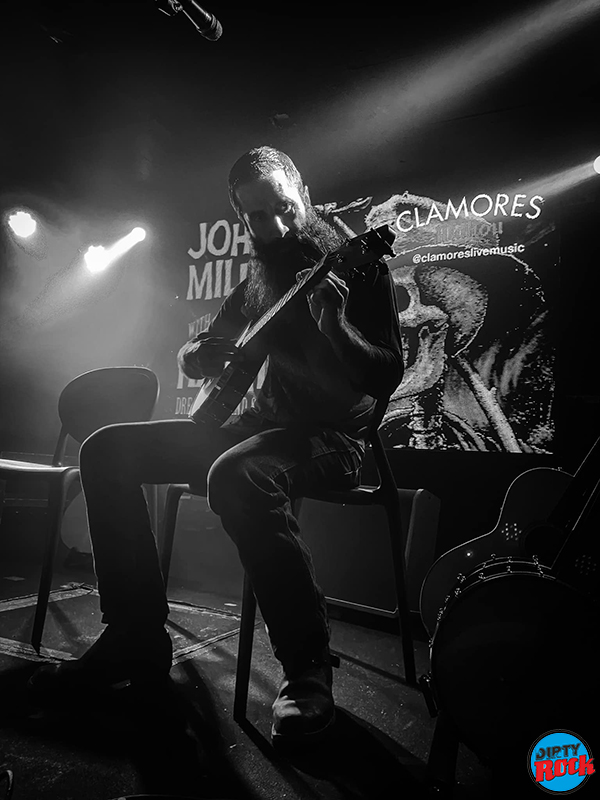
¿Qué papel juegan los trenes, las penurias, los viajes o los remordimientos en tu música?
—Pues en estos 42 años he vivido de todo un poco… No digo que haya que vivir las historias para convertirlas en canciones, pero desde luego ayuda. En muchos casos, las he escrito para recordarme a mí mismo cómo elegir mejor en la vida, cómo tratar mejor a los demás, para no olvidar nunca ni los buenos ni los malos momentos.
Además de la música, trabajas como carpintero y restaurador. ¿Crees que tu experiencia profesional te ayuda a conectar con tu público?
—Sin duda. Todos los oficios y trabajos que he aprendido y desempeñado a lo largo de los años me han servido para conectar con la gente de a pie. Creo que, tristemente, la figura del “poeta del pueblo llano” se ha ido perdiendo en las últimas décadas… Parece que hoy en día uno solo puede ser artista o currante, pero no ambas cosas. El hecho de que mi historia personal esté ahí fuera y sea conocida por mis seguidores, les facilita identificarse conmigo y con mi música, sabiendo que no salí de una escuela de música de élite directo a Nashville.
Te mudaste a Nashville desde Alabama, pero vives por todas partes. ¿Qué referencias culturales y musicales arrastras de tantos sitios?
—Hoy por hoy, cuando me preguntan, suelo decir que soy de Alabama, pero en realidad ya no siento que sea “de” ningún sitio. Hay cierta belleza triste en eso de no tener un hogar fijo: te obliga a construirlo allá donde estés. Me gusta imaginar cómo debe de ser crecer en todas las ciudades y pueblos que he atravesado, en todos los paisajes del mundo que he visto, y creo que eso alimenta aún más mi creatividad.
¿Qué opinas de la gente que dice que odia el country, pero cuando se entera de que ciertos artistas vienen del punk o del metal, de repente les gusta?
—Creo que el country arrastra un estigma desde hace más de treinta años, y con razón. La maquinaria comercial ha vaciado gran parte de su poesía y autenticidad. Así que es normal que muchos que vienen de escenas más crudas como el punk o el metal sientan rechazo hacia el country tradicional. Pero me encanta ser la puerta de entrada para esas personas al buen country y al folk de siempre.
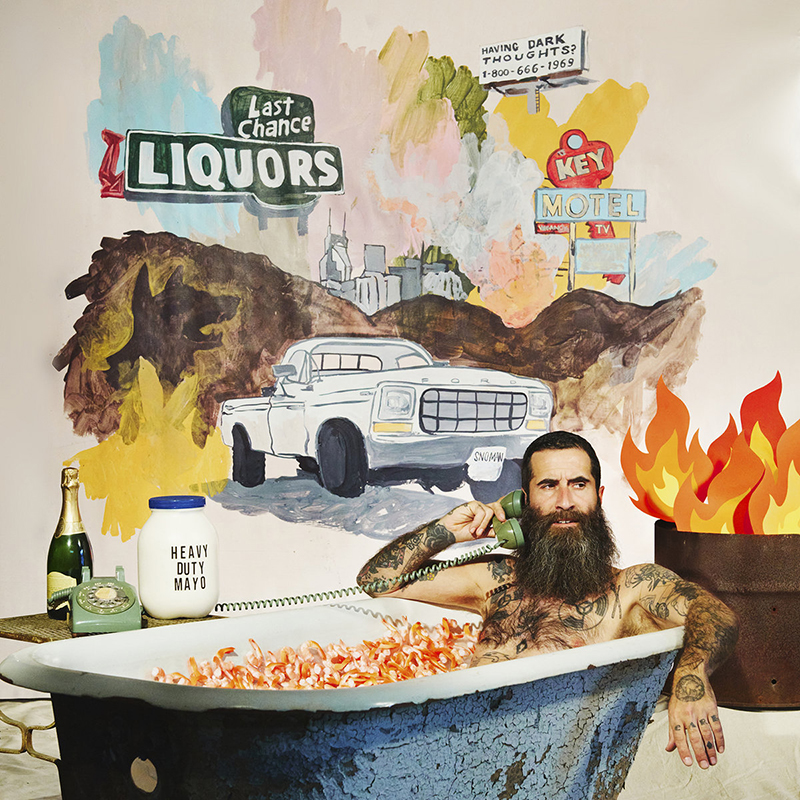
¿Te gusta lo que están haciendo artistas como Sturgill Simpson, Tyler Childers, Charley Crockett, Margo Price, Whitey Morgan, Chris Stapleton, Bob Wayne, Andrew Combs, Shooter Jennings, Ian Noe, Valerie June, Brandi Carlile y otros?
—¡Todos los artistas que mencionas son fabulosos! Me inspira mucho ver a tantos músicos ganando terreno dentro del country desde que empecé a girar hace unos 16 o 17 años. Claro que hoy en día hay una variedad enorme dentro de lo que se llama “country tradicional”, pero me parece genial recuperar ese espacio que nos arrebataron las radios.
¿Qué lugares recomendarías en Nashville a alguien que lo visite?
—Robert’s Western World es el único honky-tonk de Broadway al que aún voy. Honky Tonk Tuesdays, que ahora se celebra en Eastside Bowl, es perfecto para ver música auténtica y echar unos bailes. El Country Music Hall of Fame merece una visita, aunque mucho de lo que hay ahí no me atrae demasiado. Jane’s Hideaway es una sala estupenda para disfrutar del bluegrass, y el Station Inn es todo un clásico para el country y el bluegrass.
“Quien me lleve un plato de pulpo a la brasa en uno de mis conciertos en España… ¡se lleva un disco!” gratis!
¿Qué bandas o artistas te están llamando la atención últimamente?
—No es nueva, pero mi amiga Kristina Murray acaba de sacar disco con New West, y siempre ha sido una de mis cantantes country favoritas de mi generación. Últimamente he entablado amistad con Agalisiga “Chuj” Mackey, un cantante country nativo americano que compone y canta en cherokee. Y también merece la pena descubrir a Bob Sumner, de Vancouver (Columbia Británica).
Tras más de una década en activo, ¿de qué discos o momentos te sientes más orgulloso al mirar atrás?
—Aunque ya no suelo tocar muchos temas de mis primeros discos, sigo sintiéndome orgulloso de todos ellos… Pero sin duda, el último es el que más me representa. Es el que más genuinamente siento como mío.
Si pudieras haber escrito una canción de rock and roll o country rock, ¿cuál sería y por qué?
—Creo que Why You Been Gone So Long de Mickey Newbury es posiblemente una de las mejores canciones de country rock de todos los tiempos, sobre todo en la versión que grabó Johnny Darrell en los 60. Es increíblemente sencilla, pero está escrita a la perfección y tiene un gancho brutal. Me encanta cómo consigue ser animada, enfadada y triste al mismo tiempo.
¿Y qué te depara el futuro?
—Pues estos días no lo sé… Siento que estoy ante una encrucijada vital, pero no sé qué significará eso ni adónde me llevará. Lo que tengo claro es que difícilmente dejaré de escribir canciones, grabar discos o salir de gira, pase lo que pase.
¿Hay algo que me haya dejado?
—¡Nada en absoluto!
¿Y qué te gustaría decirle a tu público español?
—Creo que lo he dicho en todas las entrevistas, pero España ha sido desde el primer concierto mi país favorito para girar. La energía del público, la calidez, el entusiasmo y el ambiente en cada show son inolvidables. ¡Y la comida y la belleza natural de vuestro país tampoco están nada mal! Ah, y quien me lleve un plato de pulpo a la brasa… ¡se lleva un disco gratis! 😉
Entrevista traducida por Jessica Jacobsen.
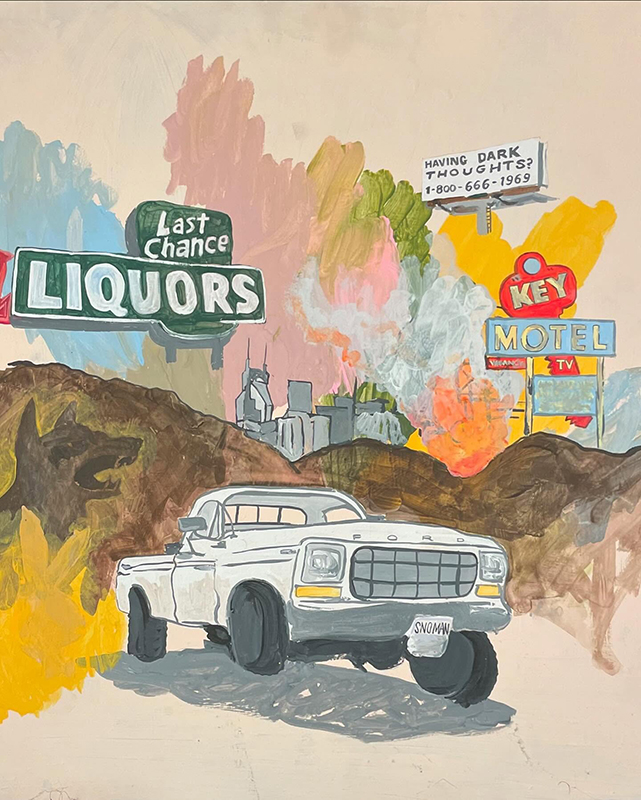
Interview with JP. Harris:
Hello JP, first of all We’d like to thank you for taking some time to answer these questions (feel free to leave blank whatever you feel like) and express also my gratitude for such an upright career which I hope still has many highlights ahead.
It’s so good to have you back with us, JP! It’s been two years since that tour of Spain with John R. Miller and violinist Chloe Edmonstone. How are you feeling and how excited are you to play with Tough Choices and present your new album, “JP Harris Is A Trash Fire”?
-My most recent tour with John and Chloe was amazing, especially to play such a different type of show for a lot of existing fans. But I always love traveling with my band, playing loud, really making an impression… I believe it’s been five or six years since I’ve returned with them and I can’t wait to be back overseas with my gang!
Why did you choose JD McPherson to produce the album? What were you looking for in his production?
-Funny enough, JD chose me… I had called him one day to ask about his experience working with a producer someone had suggested I also work with, and about halfway through the conversation, he said “ I don’t want to take anyone else’s job, but how would you feel about me producing your next album?” He and I have been good friends for some time now, but I don’t think I would’ve ever worked up the courage to ask him myself so naturally I replied with a very enthusiastic yes.
I feel that some of the best producers have depth and creativity beyond just the music itself, and crafting a record becomes more of an overall artistic endeavor than specifically just a sonic one.
JD has so much musical, art, film, and general cultural knowledge that I felt like he could truly bring out the best in all of these songs… Which he most definitely did.
How would you describe your new record?
-I’ve been labeling it “Avant Country;” by that I mean that there are many aspects that are traditionally influenced, but some of the instrumentation nor production choices, and even some of the lyrics, or rather unconventional for traditional country music. I like continuing to stretch the boundaries of country music for myself, while still keeping it feeling like something that could’ve been created 40 or 50 years ago.
What involvement did Eric Rae, The Watson Twins, and Shovels and Rope have on your album? Who will be coming with you with the band Tough Choices?
-JD and I did a lot of thinking about various guest vocalist to have on the record, but everyone that appeared was a very natural choice that became apparent as we fleshed out each song. None of the guest artists needed a whole lot of creative direction, hence we chose them for what we knew they would bring to the table on their own.
I’ve always had a rotating cast of band members, but I have some very exciting young fellows coming with me on this tour… I will let the shows speak for themselves, but everyone will be asking who they are after the last song!
Do you have a routine for writing songs?
-I wish I did, but as I have never had any formal training in music, songs just sort of come to me when they are ready. Usually, I get ideas or little pieces of lines in my head at random, and just wait for the rest of the creativity to strike. Sometimes I wish I could be more regimented about my songwriting, but I believe the way I let the songs come out of me naturally keeps them very honest and uncontrived.
What makes a good song in your opinion? Your favorite song on the album?
-I feel that a good song must possess at least three of the following: a catchy melody you just can’t ignore, superb performance, and production, or an honest subject that the listener is immediately drawn to identify with. Every now and then you get a song that has all three, but I could name examples of songs, lacking in two out of three qualifiers that are still amazing hits that will never be forgotten.
I think my favorite song on the new album is To The Doves; in some ways it feels like the most poetic song I’ve ever written, while also being somewhat cruel and cold. I was able to really lean into the baritone range in my voice, and the counter balance of the production style and Erin Rae’s angelic multi layered harmonies really made that song something special for me.
How did you start playing the guitar, your first guitar? When did you first get exposed to Country Music?
-My parents bought me my first guitar just before my 12th birthday for Christmas when you, some cheap no name acoustic thing. Within about six months, I had traded it along with an old Powell Peralta skateboard to a kid in the neighborhood for an electric guitar. For years, I just wanted to play punk rock and heavy metal, though I grew up with Country and Folk and classic rock ‘n’ roll records in my house. It wasn’t until I was a teenager traveling on foot, by freight train, and by hitchhiking, that it was no longer practical to play loud and hard music. I don’t remember how I acquired another acoustic guitar, but I’ve began learning, Hank Williams and Johnny Cash songs that seemed to fit the lifestyle I was living. So I really began listening to country music as a teenager, but I didn’t dive really deep into it until I discovered traditional Appalachian music, which then led me to the early country of the 1920s in 1930s, which then in the rn led me to the country music of the 60s and 70s.
Do you remember the first song you wrote and so what were your earliest and/or fondest musical influences?
-I wrote a few songs in my mid teenage years that were sort of protest songs; I was traveling around and working with a bunch of Native American rights, movements, surrounded by a lot of activists and radicals, and I think was trying to emulate the music they were singing and listening to. But I long forgot those songs, decided I wasn’t really good at songwriting, and didn’t write another one until I was probably 25 or 26 years old? But I do remember that the first country song I wrote and felt good about was “I’m Staying Here” from my first album. Shortly after I wrote “Two For The Road,” and then all of a sudden I realized I had a knack for writing classic country songs. I guess they say the rest is history.
What role do trains, hardships, travel, and regrets play in your songwriting?
-Well, I’ve had my share of all of those circumstances in 42 years… I’m not saying that you have to live the stories to turn them into good songs, but it surely can’t hurt. In a lot of ways, I’ve written a lot of these songs to try and remind myself of how to choose differently in life, how to treat people better, to remember the good times and also the bad times and never forget them.
Aside from music, you make your living as a carpenter and restorer. Do you definitely think that coming from a professional background helps you connect with and understand your audience much more through your music?
-Yes, I definitely believe that the many different professional trades I have learned and worked over the years have contributed greatly to my ability to connect with the everyday person. I think that sadly, the concept of the working man’s poet has truly been lost in the last three or four decades… that somehow you’re expected to only be an artist or a working person, but not both. I think that since so much of my life story is out there in the world and known by my fans, it makes it that much easier for people to identify with my music, knowing that I didn’t just come straight out of some fancy music school and right into a career in Nashville.
You moved to Nashville from Alabama but live everywhere, but What cultural and musical references do you have on of many places?
-These days, though I tell people when I’m asked that I’m from Alabama, in a way I don’t feel like I’m truly from anywhere anymore. There is a certain sad beauty, and realizing that by having no real homeplace, you have to make a home and a family anywhere you go. I like to imagine what it must be like to grow up and live in all the different cities and small towns I passed through, all the different landscapes of the world I’ve traveled, and I believe that further helps my creative mind.
What do you say to people who say they hate it, but when they find out that those artists come from the punk or metal scene, they like it?
-I think that country music has developed a real stigma in the last 30 or more years, and rightfully so. So much of the poetry and authenticity has been taken out of it by the commercial music machine. So naturally a lot of people from a more raw, punk rock or heavy metal background have a bit of an aversion to music that is thought of as very traditional. I’m always glad to be the gateway for those people into good old- fashioned country music and folk.
Do you like what Sturgill Simpson, Tyler Childers, Charley Crockett, Margo Price, Whitey Morgan, Chris Stapleton, Bob Wayne, Andrew Combs, Shooter Jennings, Ian Noe, Valerie June, Brandi Carlile, and others are doing right now?
-All of the artists you have mentioned are superb indeed! I’m really inspired to see how many more artists ever in popularity playing some variant of country music or another since I begin touring about 16 or 17 years ago. Of course, there is a pretty wild variation in the sound of what is called traditional country these days, but I’m all for taking it back from the radio!
What places in Nashville would you recommend to a tourist?
-Robert’s Western World is the only honky tonk on Broadway I’ll still go to. Honky Tonk Tuesdays, which has recently moved to the larger location of the Eastside Bowl, is an excellent place to see real-deal music and get some good dancing done. The country music Hall of Fame is always worth visiting, even if a lot of what is in there isn’t very appealing to me. Jane‘s Hideaway is an excellent little Bluegrass listening room, and the Station Inn is a classic stop for Bluegrass and Country.
What bands and/or musicians are catching your eye right now?
-She’s by no means new, but my friend Kristina Murray just released a new album on New West and has always been maybe my favorite female country singer of my generation. I’ve lately become friends with a Native American country singer named Agalisiga “Chuj” Mackey, who writes and sings classic country in his native language of Cherokee. Also worth checking out Bob Sumner from Vancouver, BC!
After more tan a decade in business, when you look back, which are the records or moments you feel more proud of?
-Well, even though I don’t play as many songs from my earlier catalogue, I’m still proud of all the records I’ve made… I would have to say that the latest one is the one I’m most proud of. It just feels like the most genuinely myself.
If you could have written one rock and roll or country rock song, what would it be and why?
-I think Mickey Newberry’s “Why You Been Gone So Long” is quite possibly one of the greatest country/rock songs of all time, especially the way that it was recorded by Johnny Darrell in the 60s. It’s so incredibly simple, but perfectly written and with an incredible hook. I love how it is upbeat yet angry and sad all at the same time.
And what does the future hold for you now?
-These days, I just don’t know… I feel like I’m coming to a fork in the road of my life, but I don’t know what that will mean or where will take me. I think it’s pretty unlikely I will ever stop writing songs, recording records, and touring no matter what changes occur.
Is there anything I’ve missed?
-Nope!
What would like to say to your Spanish fans? Thank you. Last word is yours.
-I think I’ve said this in every single interview I’ve done, but Spain has consistently been my favorite country to tour in since the first time I came. The energy of the crowds, the open and friendly and warm nature of everyone at the shows, and the rowdy enthusiasm just really make the shows unforgettable. The food and natural beauty of your country doesn’t hurt either! Oh, and anyone who brings me a plate of grilled Pulpo gets a free record 😉
Thank you again for your time, and take care.
